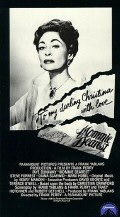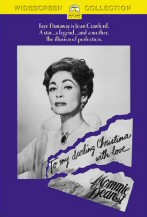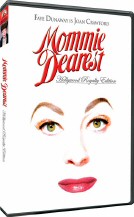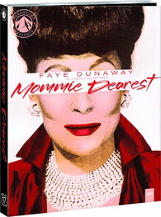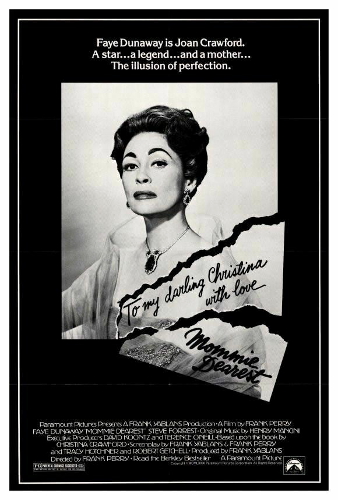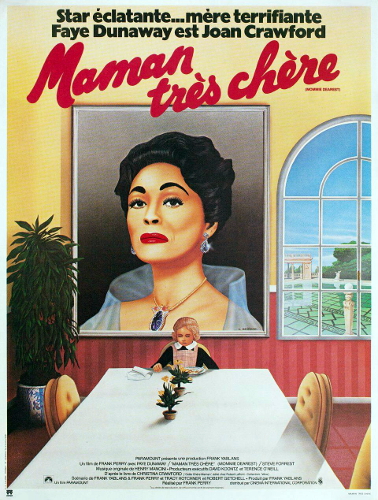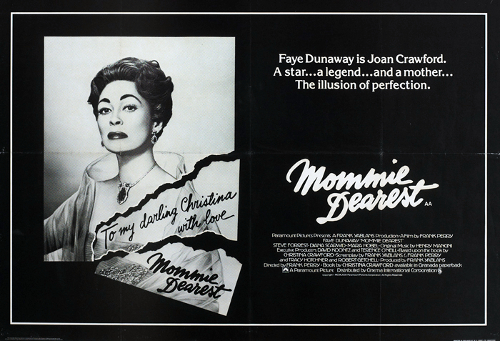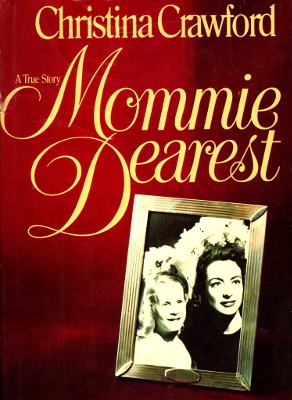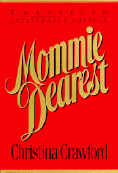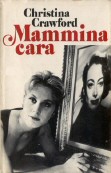|
Rating:
     of
5 of
5
I saw this movie last night at Pershing Square in Los Angeles, outside.
I
thought it was fantastic! It was scary, funny, dramatic, and the acting was
great! Some movies were ahead of their time -- this was one of them. It`s a
real buffet -- it`s got everything thrown in and some of the most classic
lines I`ve ever heard. It was like a horror movie at times, sometimes kind of a
split personality "Homicidal" William Castle movie, then at other times
strangely touching, and at yet other times hilarious. As good as "Baby Jane."
I
was knocked out!
Jack
Boyd (October 2009)
Rating:
 of
5 of
5
I
am a big fan of camp films, but this is an exception. I watched
this film purely for the experience, and I don't know how I managed to
sit through the whole of this badly acted, badly written and stupid
film. A sequence in which Joan wakes at 4:00 a.m. and prepares herself for
the day is about the most interesting bit in the whole film. Faye Dunaway portrays Miss Crawford with just about no truth at all.
I read the book around 2 years ago and laughed at Christina's childish scrawl. I was ashamed
that even an unloving person like Christina could write such a book
about her own mother, and also ashamed Paramount even considered
turning it into a motion picture.
Of course we all remember the "wire hanger" scene (but I have to
say I
enjoyed watching that little brat being hit, then later having her hair
chopped of, then finally being nearly strangled by Joan [all of which
are lies, of course]). Another scene in this film is Joan sitting
around a table of businessmen. When they try to dismiss her she tells
them "Don't fuck with me, fellas! This 'ain't my first time at the
rodeo"; this scene has actually turned into one of my most favourite
film scenes, as it shows a strong woman, with more power than a male,
telling men how things are going to be.
Apart from this, the film is laughable, but also sad to watch a lovely woman being portrayed like this after her death.
This film should not be recommended to a person who knows very little about Miss Crawford, as it would give them the completely wrong impression.
But I must end this review with a comment Marlene Dietrich made, which I agree with: "I did not know Joan Crawford
but nobody deserves that kind of slaughter. Too bad she did not leave
[Christina] where she found her, so she could now be spitting out
her poison in the slums of some big city. I hate her with a passion,
and I know the public will."
I rate this 1 out of five. For a film like that, 1 star is very generous.
Sandra (August 2007)
Rating:
     of
5 of
5
This is the movie that introduced me to Joan. I was seven years old when I watched Mommie Dearest. Now being that young you would think that I would be afraid of Joan Crawford,
but I was fascinated with this woman! The way she lived & the way
she was independent & driven to remain on top of the movie
industry. She was the ultimate glamorous movie star from start to
finish. The acting is way over the top just like dare I say the
eyebrows. The child & adult Christina are very annoying & I
wished that she would slap them harder. I would suggest this movie for
anyone who wants a good laugh, but please remember to take it with a
grain of salt. After all the book & movie came after Miss Crawford
had passed so she was not here to give us her side of the story. I'm
seventeen now & I'm a devoted Joan Crawford fan. Mommie
Dearest did not in anyway trash my image of the screen queen who is Joan Crawford. Maybe Faye Dunaway, but never Joan. After all she is "Hollywood Royalty"!
Some of my favorite quotes include:
Joan--No wire hangers!!!!!!!!!!
Joan--Tina bring me the axe!!!!!
Joan--Don't Fuck with me Fellows!!!!!!!!!
Joan--I'm not mad at you, I'm mad at the dirt!!!!
Joan--I'm not acting!!
Joan--I can handle the socks.
Christina--That is a lie.
Joan--Why
can't you give me the respect that I'm entitled to? Why can't you treat me
the way that I would be treated by any stranger on the street??!!
Christina--Because I'm not one of your fans!!!!!
Danny
M. (November 2005)
Rating:
     of
5 of
5
I absolutely love the movie and I find it to be one of the most hilarious
things I have ever seen. It is one of my favorites ever. The script is
fantastic, and I know many of the lines by heart. I love how Faye portrays Joan,
whether or not the events in the movie actually occurred. It's just the
best. The over-the-top acting that Dunaway does is excellent. I cannot even begin to describe the joy that overcomes
me when I watch this movie. I am a fanatic.
By the way, my favorite line would have to be:
"CHRISTINA, CHRISTOPHER, DAMN IT! Carol-Anne, I asked you to KEEP the
CHILDREN QUIET today! And for Christ's sake get them out of the gardennn!"
Also, I cannot forget the quintessential "NO WIRE HANGERS!... Christina get
outta that bed!"
mycatjewel
(October 2005)
there are so many things wrong with this poor excuse of a movie that I may
not even remember all of them, however I will say these problems: Faye Dunaway
finally found a way to show she's not that talented that she just chose films
that were well written so nobody could notice, both girls who played Christina
pretty much ended their careers with this before they even began, those damn
eyebrows! I mean they don't even look like eyebrows it looks more like Faye
shaved off her eyebrows and drew a new pair on with magic marker and the color
doesn't match the wig making it look like Joan dyed her hair (obviously the wig
was not the right color as well), and Faye's lips. I didn't notice the dialogue
so much because I was staring at her mouth, she's like Angelina Jolie in this
role because her lips scare me. and lest we forget: NO WIRE HANGERS!!! God! I
don't even say that as a joke anymore it got so
annoying.
Jonathan from RI (July 2005)
Rating:      of 5 of 5
Faye Dunaway plays Joan. This movie is hilarious. It's sort of
dark but its
lines are extremely campy. I think the movie was made like this on
purpose so people would not forget the depiction of child abuse in the
movie. This movie has a lot of fabrications about Joan and a lot of
truths. Its a must-see because it gives you a premise of what the
book Mommie Dearest is about. The movie is a camp classic and it's a
foundation to get to know a little bit about Joan. I'm hoping for a 25th anniversary edition on DVD but I don't think we
are so fortunate. Watch and enjoy!!
James (July 2005)
Rating: 0 of 5 as a drama,      of 5 as a comedy
of 5 as a comedy
Prior to her death in 1977, Joan Crawford stated that Faye Dunaway was
one of her favorite young actresses.It was easy to understand why: like Joan, Dunaway spent part of her childhood in Texas, she played strong
ladies extremely well, she had good cheekbones, and (interestingly) she
shared the same middle name as the one Crawford was given at birth (Lucille Fay LeSueur and Dorothy Faye Dunaway respectively). Joan's endorsement of Dunaway was very high praise indeed, and one would logically assume that Faye was appropriately flattered. But then
"Mommie Dearest" came along. If this is how Faye responds to a compliment, I’d hate to see how she treats her enemies.
According to Christina Crawford's 1988 book "Survivor," Faye Dunaway desperately wanted to play Joan Crawford. After previous contender
Anne Bancroft read the script and wisely fled for higher ground, Faye took it upon herself to show up at the producer's house late one night all dolled-up like Joan. The producer, Frank Yablans, apparently flipped at Dunaway's "uncanny" resemblance to Crawford, and the rest, unfortunately, is Hollywood history. The number of times Dunaway's winced at the memory of this can only be guessed at, but I imagine she’s still wincing today. As she should be. All one can think while watching "Mommie Dearest" and laughing uproariously at the most inappropriate moments is: "Oh, Faye...what hath thou wrought?"
The plot of "Mommie Dearest," based on Christina Crawford's controversial (some would say questionable) 1978 memoir of the same
name, pointedly illustrates everything that's wrong with the film: Bitchy Movie Star (the only plot element that's clearly defined from the get-go) decides to adopt girl child. Bitchy Movie Star then spoils girl child. Bitchy Movie Star then adopts boy child and (for no apparent reason) straps boy child to bed. Bitchy Movie Star (again for no apparent reason) decides to lock girl child in pool house, cut off girl child's hair, steal girl child's dollies, force girl child to eat raw steak, beat girl child with wire hanger and scouring powder can, and then banish girl child to expensive
boarding school. Boy child inexplicably disappears mid-way through the
movie (although he pops up again at the end, with no explanation about where he's been). Bitchy Movie Star later becomes friends with grown-up
girl child.
Inexplicably, Bitchy Movie Star then decides to cut grown-up girl child and grown-up boy child out of her will when Bitchy Movie Star dies ("for reasons well known to them"...but not to the audience, unfortunately), prompting girl child to become bitchy girl child and seek revenge by writing a nasty book about Bitchy Movie Star, thus giving bitchy girl child
"the last word." Whether by accident or design, the glaring plot holes and poorly developed characters and relationships leave the viewer to surmise only one thing: that Joan Crawford was just mean. Period. End of story. Right there, the movie (like the book it was based upon) demonstrates a profound lack of depth, utterly failing to explain or
interpret the main character's actions beyond tossing out the oft-repeated line: "Because I'm damn mad!!!" Why she's mad and what motivates her behavior are never adequately explained, and it's impossible
to take the movie seriously as a result.
Joan's very human struggles, emotions, personal experiences, and needs are only vaguely touched upon, often in the midst of highly emotional scenes where the girl child's whiney screams drown out the Bitchy Movie Star's stream of consciousness dialogue. One revealingmoment in the "night raid" scene contains the following line uttered by Faye as Joan: "Your room looks like a cheap two-dollar-a-week furnished room in some two-bit backstreet town in Oklahoma!" This connection to
Joan Crawford's own impoverished childhood is a rare moment of depth
in an otherwise shallow movie, but it's entirely lost and rendered inaudible
due to the incessant screeching of Mara Hobel as young Christina. The fact that the screenplay makes no mention of the tragic physical and emotional abuse Crawford herself suffered as a child, which would've humanized her and helped explain her behavior, was a grave and irresponsible oversight.
Ultimately, all that's left is Faye Dunaway in kabuki make-up on one hell of a menopausal rampage, and an obnoxious, highly irritating brat you find
yourself wishing Dunaway would smack just a little bit harder. This, of course, is not the reaction the film-makers were aiming for, which graphically illustrates how badly they screwed things up. There are no
sympathetic characters in the film, and the lousy script, Miss Dunaway's
over-the-top performance, and the horrible acting by both Mara Hobel and
Diana Scarwid as "Christina" combine to create a pointless examination
of a highly volatile mother-daughter relationship, and an unforgivably one-dimensional portrait of a very complex and multi-faceted woman, reducing
Joan Crawford to nothing more than a grotesque caricature of her on-screen image.
Dunaway only once briefly channels Crawford, in the scene where she’s
rehearsing for the "Mildred Pierce" screen-test. Otherwise, her performance is the same as the one she gave in "Bonnie and Clyde." And
in "The Towering Inferno." And in "Chinatown." And in "Network." And in
"The Eyes of Laura Mars." And in "Evita Peron." And in "The Wicked Lady." Ad infinitum. Taking this into consideration, it becomes patently
clear that Miss Dunaway is not a gifted actress, and that if off-screen accounts of her behavior are to be believed, the only character she can
adequately portray is essentially a one-note version of her own bitchy, demanding self.
As for Faye's physical resemblance to Miss Crawford, well...let's just sum it up by saying: "not so much." Crawford's beauty and magnificent bone structure are clearly beyond Faye's mousey, pallid reach. Other than her prominent cheekbones, there really wasn't much to work with. The make-up and hair experts hired for the film didn't do much to help,
plopping wigs on Faye's head that were the wrong shade of red and pasting on false eyebrows (yes, they actually make such things!) which
vary in thickness and position right in the middle of scenes, jumping all over her forehead like inky black centipedes searching for prey. Ultimately,
the eyebrows are more Groucho than Crawford, and they're all one can look at whenever Miss Dunaway's on-screen. Her lips suffer similar
mistreatment, more often than not painted to garishly clown-like proportions, leaving Faye with a leering, gloppy grin which can only be
described as Lucille Ball on crack. If Dunaway resembles anyone in this
film it's Michael Jackson circa 2005, and the resulting hilarity of this unfortunate "separated at birth" realization sends the movie right off the
camp-o-meter.
The wardrobe they saddled Faye with also utterly fails to evoke Crawford.
The closest it comes to "Joan" is how she looked in "Susan and God," a film in which she deliberately parodied her own "clothes-horse" image
in her role as a flakey socialite. Crawford did not dress like this in real life
or, for that matter, in any other film. As a result, in "Mommie Dearest" Faye's outfits lack the tailoring, sophistication, and attention to detail associated with Joan. Even Faye's shoulder pads are scaled down, and
the overall look never quite captures Crawford's flair and style. Joan Collins subsequently had greater success evoking Crawford in her "Dynasty" frocks than Dunaway's misguided attempt in "Mommie Dearest."
In my review of "Queen Bee," I pointed out that "Mommie Dearest" borrowed heavily from this over-the-top 1955 Crawford extravaganza. The comparisons are glaring and regrettable, and Faye Dunaway clearly
took note of Christina Crawford's debatable assertion that Joan's performance in "Queen Bee" was how Joan was in real life. It bears
repeating from my review that "...the immediate connection between Joan smearing cold cream on a mirror in 'Queen Bee' and Faye playing
Joan with cold cream smeared on her face during the infamous 'no wire
hangers' scene in 'Mommie Dearest' made me wince. As well, the set designer on 'Mommie Dearest' blatantly copied the lay-out of the entrance
foyer and staircase in 'Queen Bee,' dressing it up as 'art deco' instead of
'50's southern chic' in order to represent Joan's home. Even the crinkly
sheer curtains on the windows are the same, and as Joan paused on the
staircase in a black gown in 'Queen Bee,' I again winced at the mental
image I flashed of Faye standing on the staircase holding baby Christina
like an Academy Award in "Mommie Dearest."
Ultimately, the biggest flaw in "Mommie Dearest" is the way the movie was edited, and the resulting mess leads one to wonder if the editor was a hardcore Joan Crawford fan, hell-bent and determined to make Miss Dunaway look as silly and incompetent as possible. Not that she
needed much help. The editing is slap-dash and abysmal, and there are
too many scenes to mention where continuity is blown and mistakes
are made (the modern Formula 409 bottle on Joan's 1940's bar is one of
the most glaring examples).
The best editing gaffes, however, are the ones which allow the audience
to revel in the full horror of Faye's histrionics while she thoroughly embarrasses herself. My very favorite moment in "Mommie Dearest" is
one not often mentioned in discussions about this film: after the infamous
"no wire hangers!" scene, Dunaway commands Mara Hobel, in shrill, operatic tones, to "Clean up this mess!" After Mara asks "How?", Dunaway barks "You figure it out!" With her face smeared with lipstick and cold cream dripping from her chin, Faye robotically turns her head
and in a moment of sheer cinematic insanity slowly goes cross-eyed.
Without fear of contradiction, I believe it can safely be said that this ranks as the absolute worst moment featuring an A-list actress EVER
captured on celluloid. The reason Dunaway's career seriously faltered after "Mommie Dearest" can be summed-up in one ill-advised cross-eyed
glance.
And if her most recent gig on an insipid, now cancelled reality TV show was her punishment, one can only sit back and smile. Her signature line
on the show, delivered in her bitchiest tones as she gleefully banished
aspiring young actresses from her sight, is an exit cue Miss Dunaway
herself should perhaps take note of. "Don't call us, we'll call you" indeed,
Faye. We hope you're not sitting by the phone waiting for it to ring, dear...we threw away your number long ago.
Memorable Lines:
Joan: "I'm not mad at you, I'm mad at the dirt!"
Joan: "Christina! Bring me the axe!"
Joan: "I should've known you'd know where to find the boys AND the booze!"
Joan: "I’d rather you go to school bald than looking like a tramp!"
Joan: "Scrub, Christina, scrub!"
Joan: "Don’t FUCK with me, fellows!"
Joan: "No wire hangers...EVER!!!"
|
